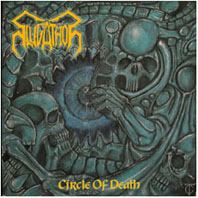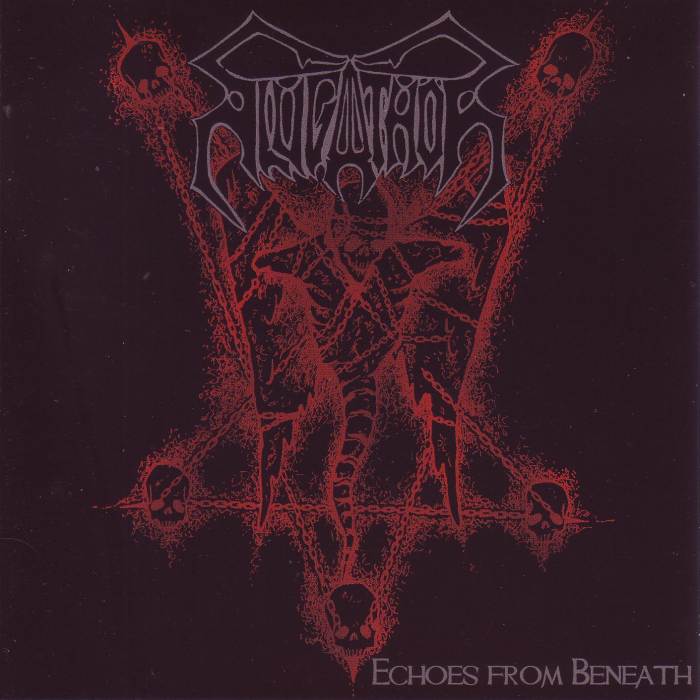Post by brutalwarning on Dec 10, 2009 2:45:18 GMT 2

SLUGATHOR (1999-2009) R.I.P.
Downfall is coming!!! Last concert: 18th of Dec @ Semifinal Club,
Helsinki
www.myspace.com/slugathor



REVIEWS (at Metal Archives)
"One hell of a swansong" - 97%
Written by iamntbatman on November 19th, 2009
Sometimes the most oft-used descriptions are the most accurate. In the case of Slugathor, the term "old-school" gets tossed around quite a bit and in this case, the description absolutely fits. The band worships at the altar of the heaviest death metal bands of yore but, impressively, has transformed from a "me too" old school death metal band into a crushing juggernaut of creative inspiration.
The biggest influence on Echoes From Beneath is probably Bolt Thrower, evidenced by the massively drop-tuned chugging guitar riffs, slower, doomy moments, moderate use of melodic elements and generally pummeling atmosphere. Other influences also rear their heads, notably older Finnish death metal bands such as Demigod. The songs are essentially riff-fests that move between chugging, thrash type riffs, faster tremolo sections and taffy-like doom sections. The guitar tone is absolutely gigantic. It's heavily distorted but there's almost no treble in this tone, just pure bassy goodness. As with Bolt Thrower's Those Once Loyal, the band manages to achieve this ludicrously low, heavy tone while still somehow leaving room for the bass to be heard. It just plays along with the guitar riffs for the most part but adds considerable weight to the already Louie Anderson-giving-a-piggyback-ride-to-Rosie-O'Donnell weight provided by the guitars. This ridiculously low riffing style leaves the higher end of the EQ free for those melodic leads to fill up. They're usually slow-burning affairs that occur during the vocal-free segments of the songs and there aren't really many solos going on (halfway through "The Smoke" there's something that's somewhere between a lead melody and a solo, which is pretty representative of the lead guitar work on the album) but they do contribute to the melodicism and add some much needed high end in what's otherwise a very bassy mix.
I'm not normally a fan of ultra-deep growling, but the vocal approach Slugathor have always had and maintain on Echoes From Beneath is refreshing and the vocals are pulled off flawlessly so I can't help but love them. Essentially, the main vocals are along the lines of something you'd hear on a doom/death or even funeral doom album. Think Evoken and you're not too far off the mark. They're delivered in a slow, drawn-out way that lends a strong sense of oppressive atmosphere to the album. What really makes them special, though, are the straightforward black metal shrieks that serve as backing vocals. I'm not just talking about a couple of instances on the album, I'm talking about heavy use of these backing vocals that double the main vocals for about half of the album. They could stand to be a little higher in the mix, honestly, but they sound really good and mix perfectly with the deeper growls. You don't hear this kind of thing often enough in old-school death metal.
The drumming is very much in the Bolt Thrower vein. Faster riffs are usually kept in time with pounding double bass rolls and steady cymbal-snare patterns or a fairly simple punk beat. The slower sections have some really minimalist drumming, often just a cymbal keeping time with some accent drum hits. A few of the album's fastest riffs get the blastbeat treatment, but these are rare. The fills are pretty simple, as well. Overall the drumming is far from mind-blowingly technical but amping up the technicality over riffs as bone crushing as these would only make the drums sound over-indulgent.
The production and songwriting are the best we've yet seen from Slugathor. This record is more atmospheric than anything they've recorded before and it's really a treat to see a band use an influence like Bolt Thrower to craft something in a similar vein yet with a completely different aura about it. The way the band brings in the slow riff from opener "Summoning" into the closing minutes of the album are just plain class. This is absolutely essential listening for fans of crushing old-school death metal. Fans of more modern styles should give it a listen, too, as it's a lesson in how to instill weight into riffs and songs without resorting to blinding speed or technicality. A landmark release in the genre.
---------------------------------------------------------------------
"The Invocation" - 95%
Written by MacMoney on November 16th, 2009
The shift from their debut to the second album Circle of Death was a very notable step for Slugathor. They turned down the riff after riff onslaught a bit, taking more time thinking over every song and making them more coherent and efficient. The shift from Circle of Death to Echoes from Beneath is more subtle, yet becomes evident with numerous listens. While the debut was a rather mess of organically evolving riffs, Circle of Death was already carefully thought out and more controlled even though it did have numerous full speed forward moments. Echoes from Beneath however has very few of those. Majority of the album is surprisingly laid back, reminding one a bit of Obituary in terms of tempos and structures though Slugathor goes even to doomy lengths at times.
But the slow to mid-paced tempo works well for the album since the most superb aspect of it is the rhythmic interplay between the drums and the guitars. Slugathor rely heavily on the rhythm parts of their music, which doesn't come as a surprise considering that the long time members are the drummer and the (mostly) rhythm guitarist and this is where their strength lies as well. Tommi and Immu play very fluidly along with each other, the drums always supporting the guitar and not rising up to take the spotlight for themselves. For example, the more complex parts of riffs with numerous chords are often timed on the fourth bar so as to coincide with the fill to add more force to the chords. The presence of this interplay becomes very evident at the oddest moment: when it disappears. The fifth track, Abomination, lacks this aspect in its verse. The riff is simple until the third bar when it rapidly accelerates its chord rate and yet the drums keep playing a simple one-two beat. At first the riff is on its own without any beat to back it up except a few hits on the fourth bar and it works, but with the odd drumbeat back it, it just sounds distinctively off.
The riffing itself is very rhythmic, reminiscent of Bolt Thrower and Obituary, and as mentioned works well together with the drums, vital chords being played right on a drumhit, making the crushing riffs even heavier and more devastating. The riffs are in general quite simple, there's nothing too technical here, just effective and unbelievably catchy. Comparing to any other death metal in its weight class, there's none with riffs as memorable and catchy as these. One reason for this is the generally slow tempo of the album. Without the constant fast pace and overpowering drums, the riffs have more foreground to cover. This is in fact something they need to do. Leads are rather sparse and always appear during the slow parts of the song, appearing leisurely menacing and very deliberate. No chaotic bursts to be found here. The bass has an excellent rumbling sound and follows the guitars rather closely providing a solid backbone. As always with Slugathor, the sound on the album is heavy on the low end so that rumble is constantly present. The vocals are low as well, just as before. They are used surprisingly little on the album. There are numerous slow and long stretches without any and these often end up sounding the most ominous and atmospheric. The album is meticulously mixed, everything audible and in good proportion to each other.
While this may not be the most revolutionizing album out there, this kind of death metal is quite seldom heard these days, especially executed with such exquisite taste. Not a lot of death metal is written in this particular way, with slow and long buildups to explosive and fast crescendos, and not many can make their slow parts sound so menacing and malevolent as well as crushing. Each song seems like an intricate ritual to prepare the coming of something otherworldly and unknowable to us.